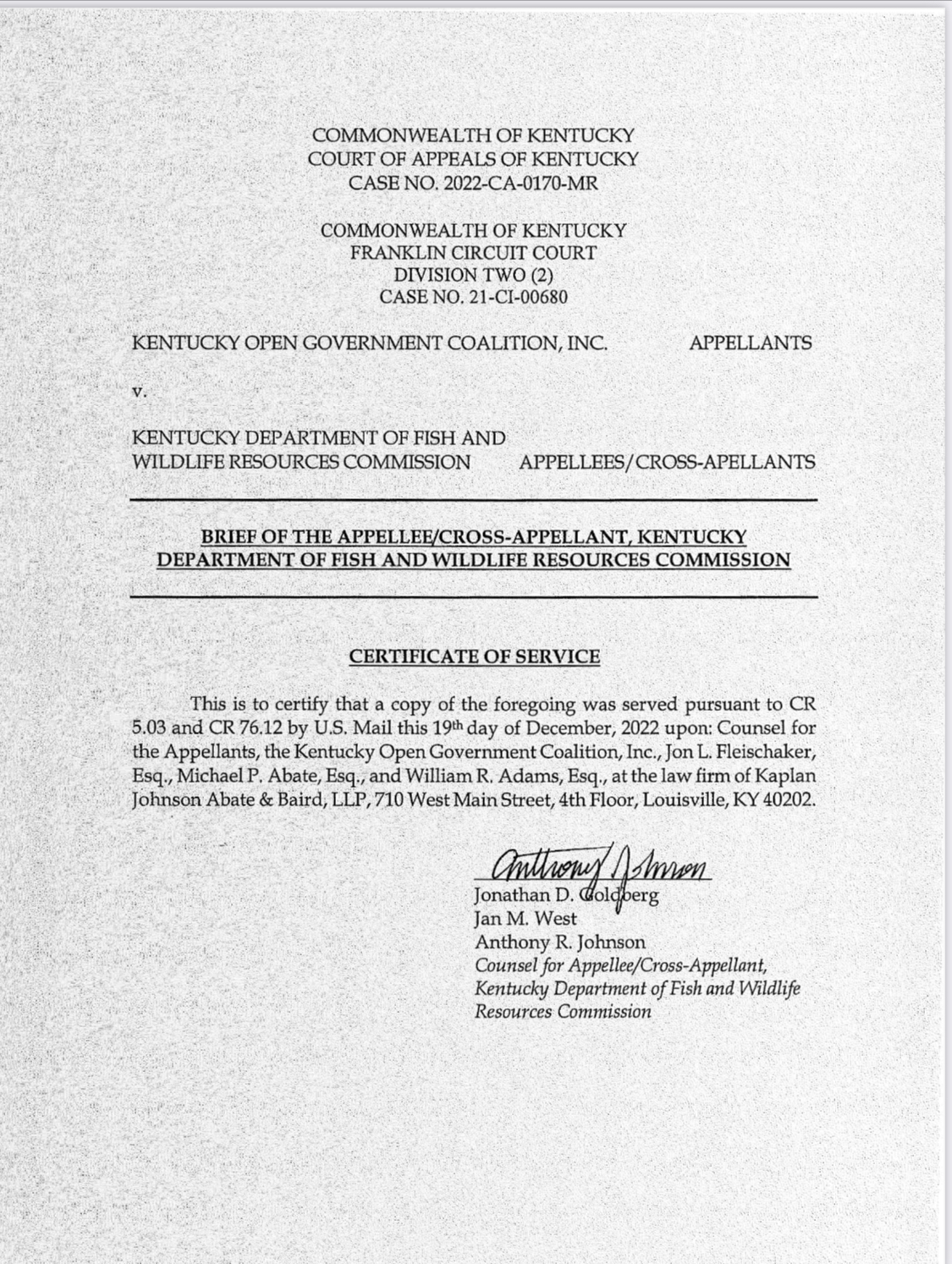
The Kentucky Department of Fish and Wildlife Resources Commission on December 19 submitted a brief to the Kentucky Court of Appeals in its open records case against the Kentucky Open Government Coalition.
Attorneys for the coalition describe the case as one of “vital importance.”
The case began with the commission’s partial denial of the coalition’s August 2021 request for emails and texts relating to the commission’s official business that were exchanged by the nine gubernatorially nominated and Senate confirmed commissioners, two named Department of Fish and Wildlife officials, and two state representatives — within a
specified timeframe — on both government issued and privately owned devices and accounts.
The commission produced some responsive records stored on publicly issued and owned devices and accounts but denied the coalition access to emails and texts relating to commission and department business that were exchanged on private devices and accounts. In support, the commission cited 21-ORD-127. That open records decision had been issued by Attorney General Daniel Cameron a few months before. It echoed a long since discredited 2015 open records decision. The latter open records decision, 15-ORD-226, ignored years of prior decisions recognizing that “in the end, it is the nature and purpose of the document, not the place where it is kept, that determines its status as a public record.”
https://www.ag.ky.gov/Resources/orom/2021/21-ORD-127.pdf
https://www.ag.ky.gov/Resources/orom/2015/15ORD226.doc
https://cases.justia.com/kentucky/court-of-appeals/1999-08-12-1998-CA-0…
Although the reader would never know it from the commission’s brief, the Franklin Circuit determined that both email and texts related to official business, on the commissioners’ private devices and accounts, were “public records” for open records purposes. The court limited the commission’s duty to disclose to commissioners’ emails relating to public business exchanged on private devices and accounts, determining that disclosure of public business related texts on private devices would constitute an undue burden (albeit absent clear and convincing evidence of an undue burden in relation to the coalition’s request).
https://apps.legislature.ky.gov/law/statutes/statute.aspx?id=51391
In its brief to the Court of Appeals, the commission once again emphasizes the "voluntary" nature of service on the Kentucky Department of Fish and Wildlife Resources Commission. It discounts the commission's statutorily assigned (and critically important) duty to "keep a watchful eye upon the Department of Fish and Wildlife Resources," the statutory mechanism for gubernatorial nomination and Senate confirmation, and reported incidents of prohibited political influence peddling in that appointment process in contravention of state law.
https://apps.legislature.ky.gov/law/statutes/statute.aspx?id=48914
https://apps.legislature.ky.gov/law/statutes/statute.aspx?id=52186
https://www.kentucky.com/news/politics-government/article258774438.html
https://apps.legislature.ky.gov/law/statutes/statute.aspx?id=1949
The commission also advances the unprecedented (and illogical) claim that commissioners “are restricted by statute to only conducting business as a body, not as individuals,” and communications exchanged “outside of public meetings do not fall within any definition of a public record.”
Imagine the implications for open records noncompliance as it relates to public business conducted by scores of elected and appointed public officials — as well as public employees — outside of public meetings, should this absurdly narrow interpretation of the law prevail.
The commission quotes, with approval, a statement that appeared in the Franklin Circuit Court’s split decision:
“On the outset, it seems incredibly invasive and truly an act of government overreach to subject emails sent or received from private accounts to the Open Records Act.”
The commission ignores the statement that immediately follows in the Franklin Circuit Court’s opinion:
“Nonetheless, state employees, officials, volunteers, etc. should not be allowed to circumvent the Open Records Act by using a private email account to conduct state business.”
The Franklin Circuit Court understood the enormous potential for abuse of the open records law that would result from any other holding.
The commission ignores it.
To be clear:
Kentucky Open Government Coalition, Inc. v Kentucky Department of Fish and Wildlife Resources Commission is not a case about “limitless” public records requests necessitating the mandatory surrender of private cellphones to agency officials.
Public agencies can, and will, continue to discharge their statutory duties by assigning public email addresses to all elected and appointed officials and employees and limiting discussions of public business to those devices; directing officials and employees to forward communications relating to public business exchanged on private devices or accounts to public accounts; and/or, upon receipt of an open records request, sending officials or employees who are likely to maintain responsive records a directive to forward those responsive records to the agency’s records custodian for review and production as legally required.
Willful concealment/destruction of responsive communications can, and will, be dealt with in the same manner it always has.
Kentucky Open Government Coalition v Kentucky Department of Fish and Wildlife Resource Commission is not a case about hapless public agency “volunteers” — or any other elected or appointed public official or employee — blindsided by demands for purely private communications that infringe on their personal privacy. It is not a case about threats of “fishing expeditions” through their personal devices and accounts.
This is exaggeration and fear-mongering at its worst, designed to divert attention from critical issues of public agency accountability.
Kentucky Open Government Coalition v Kentucky Department of Fish and Wildlife Resource Commission is, instead, a case that will effectively decide the future of Kentucky’s open records law (with foreseeable dire consequences for the open meetings law).
The public’s statutorily established right to know how public servants conduct the public’s business rests in the balance.



